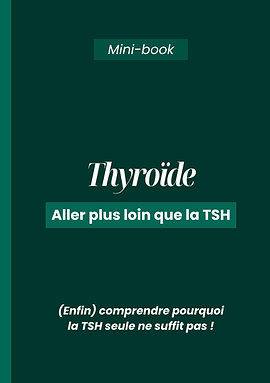

Find the right support* for you
and take care of yourself naturally
A philosophy, a science, an art.
The word "Naturopathy" finds its etymology from the Anglo-Saxon "Nature's path".
Follow the path that nature offers.
And this is the essence of naturopathy. It is an art of living oriented towards nature in order to preserve good health.
A philosophy, a science, an art.
The word "Naturopathy" finds its etymology from the Anglo-Saxon "Nature's path".
Follow the path that nature offers.
And this is the essence of naturopathy. It is an art of living oriented towards nature in order to preserve good health.
Thyroid: Conductor of
your Body's Symphony
Aujourd'hui les maladies thyroïdiennes font partie des pathologies les plus courantes et touchent plus de 200 millions de personnes dans le monde. Parmi lesquelles :
Hypothyroïdie : La glande thyroïde est sous-active, ce qui entraîne une production insuffisante d’hormones thyroïdiennes et un ralentissement du métabolisme.
Hyperthyroïdie : La glande thyroïde est suractive, ce qui entraîne une production excessive d’hormones thyroïdiennes et une accélération du métabolisme.
Maladie d'Hashimoto : Une maladie auto-immune où le système immunitaire attaque la thyroïde, provoquant une inflammation chronique et une destruction progressive de la glande, menant souvent à une hypothyroïdie.
Maladie de Basedow : Une maladie auto-immune où le système immunitaire produit des anticorps qui stimulent la thyroïde de façon excessive, entraînant une accélération du métabolisme liée à l’hyperthyroïdie.
Thyroïdite : Inflammation de la glande thyroïde, généralement causée par une réaction auto-immune (comme dans la thyroïdite d'Hashimoto ou de Riedel), une infection virale (thyroïdite de Quervain) ou bactérienne.
Hashitoxicose : Phase temporaire d’hyperthyroïdie, pour la thyroïdite d'Hashimoto, due à la destruction des cellules thyroïdiennes, qui libèrent alors en excès les hormones thyroïdiennes stockées. Cette période est généralement suivie d’une hypothyroïdie lorsque la glande s’épuise. Chez certaines personnes, on peut observer une alternance entre les phases d’hyperthyroïdie et d’hypothyroïdie.
Goitre : Augmentation anormale et visible du volume de la thyroïde, pouvant être liée à un dérèglement hormonal, inflammation ou à une carence en iode.
Nodule thyroïdien : Masse localisée dans la glande thyroïde, généralement bénigne mais qui nécessite une surveillance médicale.
Cancer de la thyroïde : Tumeur maligne affectant la thyroïde, nécessitant un diagnostic précis, un suivi rigoureux et un traitement adapté.
*Les informations partagées sont uniquement à but informatif. Si vous souffrez d'une maladie de la thyroïde, un suivi médical est indispensable : seul un médecin est habilité à poser un diagnostic et à prescrire un traitement médicamenteux. La naturopathie est une technique complémentaire à la médecine allopathique, en aucun cas elle ne la remplace.
Thyroid: Conductor of
your Body's Symphony
Derrière un trouble de la thyroïde se cachent souvent bien plus qu’un simple déséquilibre hormonal.
Le corps nous envoie des signaux : fatigue, prise ou perte de poids, changements d’humeur, brouillard mental, chute de cheveux et bien d’autres encore.
Le guide de soutien “Thyroïde : Comprendre les déséquilibres de la thyroïde de A à Z” vous aide à mieux comprendre le rôle de la thyroïde, à repérer les signes d’hypothyroïdie et d’hyperthyroïdie (symptômes, bilans sanguins…) et à explorer les causes profondes.
Un guide pour vous permettre de reprendre le pouvoir sur votre santé !
Thyroid: Conductor of
your Body's Symphony
Chaque mois, retrouvons-nous pour le RDV Thyroïde du Mois !
Un rendez-vous en ligne en petit comité pour mieux comprendre le rôle de la thyroïde et découvrir des techniques naturelles pour soutenir sa santé. Un temps pour prendre soin de soi & avancer ensemble !
Thyroid: Conductor of
your Body's Symphony
Pour plus de contenu, direction la playlist “Thyroïde” sur ma chaîne YouTube Anaïs Damour pour retrouver des partages autour de la santé & de l'équilibre !
VIDÉO YOUTUBE : 5 ans après le diagnostic de la maladie d'Hashimoto ?

Thyroid: Conductor of
your Body's Symphony
30%
1
Combien de personnes dans le monde souffrent d’un trouble thyroïdien lié à une carence en iode ?
de la population mondiale souffre d’un trouble de la thyroïde lié à une carence en iode.
10
2
De combien est le risque de développer une maladie de la thyroïde chez les femmes comparé aux hommes ?
fois plus de risques de développer une maladie de la thyroïde chez la femme que chez l’homme.
12ème
3
Quand la maladie de Basedow a-t-elle
été observée pour la première fois ?
C’est au 12ᵉ siècle que le médecin perse Sayyid Ismail Al-Jurjani a décrit pour la 1ère fois cette maladie.
1957
4
En quelle année la maladie d’Hashimoto a été reconnue comme la première MAI liée à un organe ?
C'est l’année où la maladie d’Hashimoto a été reconnue comme la 1ère MAI affectant un organe.





